-
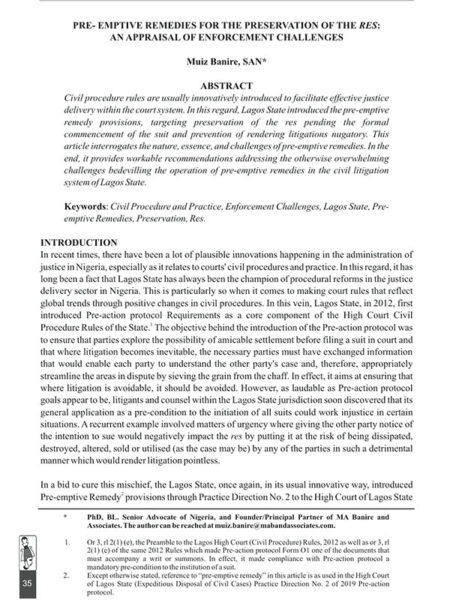
Pre-Emptive Remedies for the Preservation of the Res: An Appraisal of Enforcement Challenges
0₦2,500.00Dr Muiz Banire, SAN, Principal Partner of MA Banire and Associates, in his article, Pre-Emptive Remedies for the Preservation of the Res: An Appraisal of Enforcement Challenges, notes that the Lagos High Court (Civil Procedure) Rules 2012 introduced the pre-emptive remedy provisions, targeting preservation of the res pending the formal commencement of a suit and to prevent rendering litigations nugatory. Dr Banire interrogates the nature, essence, and challenges of pre-emptive remedies and provides workable recommendations addressing the challenges bedevilling the operation of pre-emptive remedies in the civil litigation system.
-
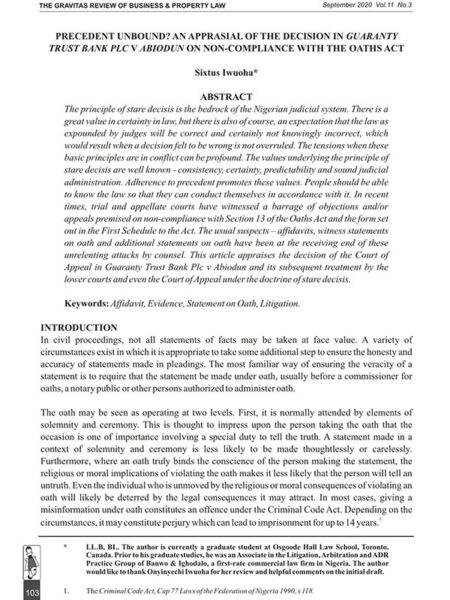
Precedent Unbound? An Appraisal of the Decision in Guaranty Trust Bank Plc V. Abiodun on Non-Compliance with the Oaths Act
0₦2,500.00Sixtus Iwuoha, formerly of Banwo & Ighodalo and now a graduate student at Osgoode Hall Law School Toronto Canada, in his article, Precedent Unbound? An Appraisal of the Decision in Guaranty Trust Bank Plc V. Abiodun on Non-Compliance with the Oaths Act, observes that in recent times, trial and appellate courts have witnessed a barrage of objections and appeals premised on non-compliance with Section 13 of the Oaths Act and the form set out in the First Schedule to the Act. The usual suspects – affidavits, witness statements on oath and additional statements on oath have been at the receiving end of these unrelenting attacks by counsel. Sixtus appraises the decision of the Court of Appeal in Guaranty Trust Bank Plc V. Abiodun and the subsequent treatment accorded to same by the lower courts and even the Court of Appeal under the doctrine of stare decisis.
-
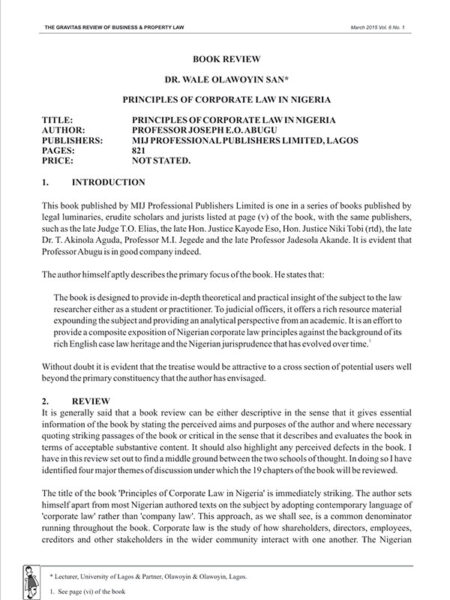
Principles of Corporate Law in Nigeria
0₦2,500.00Dr. Wale Olawoyin SAN, Senior Lecturer, University of Lagos and Partner, Olawoyin & Olawoyin, in a review that is itself a treatise on corporate law, takes a look at the book, Principles of Corporate Law in Nigeria.
-
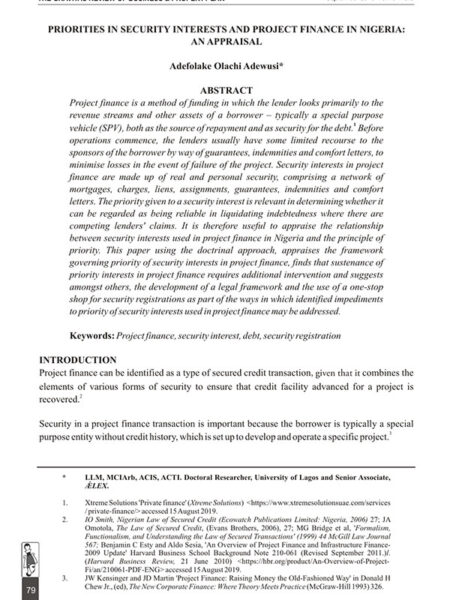
Priorities in Security Interests and Project Finance in Nigeria: An Appraisal
0₦2,500.00Adefolake Adewusi, Doctoral Researcher, University of Lagos and Senior Associate at ǼLEX in her article, Priorities in Security Interests and Project Finance in Nigeria: An Appraisal, posits that security interests in project finance are made up of real and personal security, comprising a network of mortgages, charges, liens, assignments, guarantees, indemnities and comfort letters. The priority given to a security interest is relevant in determining whether it can be regarded as being reliable in liquidating indebtedness where there are competing lenders’ claims. Adefolake appraises the framework governing priority of security interests in project finance, finds that sustenance of priority interests in project finance requires additional intervention and suggests the development of a legal framework and the use of a one-stop shop for security registrations as part of the ways in which identified impediments to priority of security interests used in project finance may be addressed.
-
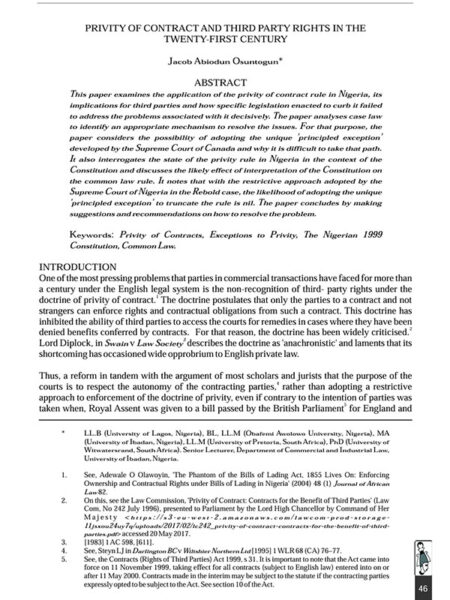
Privity of Contract and Third Party Rights in the Twenty-First Century
0₦2,500.00Dr Jacob Osuntogun of the University of Ibadan in, Privity of Contract and Third-Party Rights in the Twenty-First Century, examines the application of the doctrine of Privity of Contract in Nigeria, and its implications for third parties. He analyses Nigerian cases on the doctrine including the Supreme Court decision in Rebold v Magreola; various exceptions to the Privity rule and how specific legislation enacted to address the inadequacy of the rule have fared. He interrogates the possibility of adopting the unique ‘principled exception’ rule developed by the Supreme Court of Canada and advocates the enactment of comprehensive legislation to address the shortcomings of the doctrine.
-
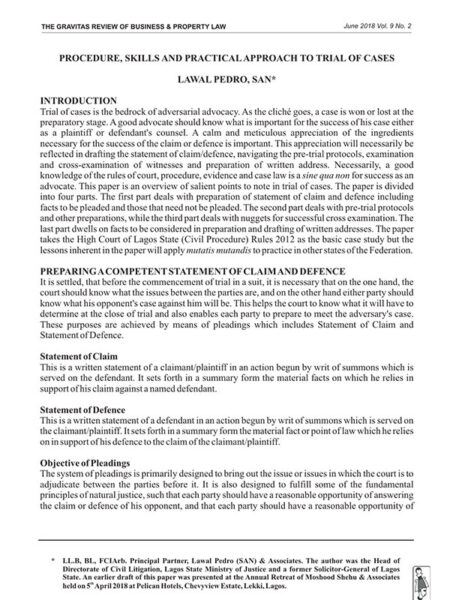
Procedure, Skills and Practical Approach to Trial of Cases
0₦2,500.00Lawal Pedro SAN, Principal Partner, Lawal Pedro (SAN) & Associates and former Solicitor-General of Lagos State in his article, Procedure, Skills and Practical Approach to Trial of Cases, notes that a good knowledge of the rules of court, procedure, evidence and case law is a sine qua non in trial of cases which is the bedrock of adversarial advocacy. Using case law as the framework and the High Court of Lagos State (Civil Procedure) Rules 2012 as the basic case study, he points out important elements in preparation of statement of claim/defence and pre-trial protocols. He gives nuggets for successful cross examination, and facts to consider in drafting good written addresses.
-
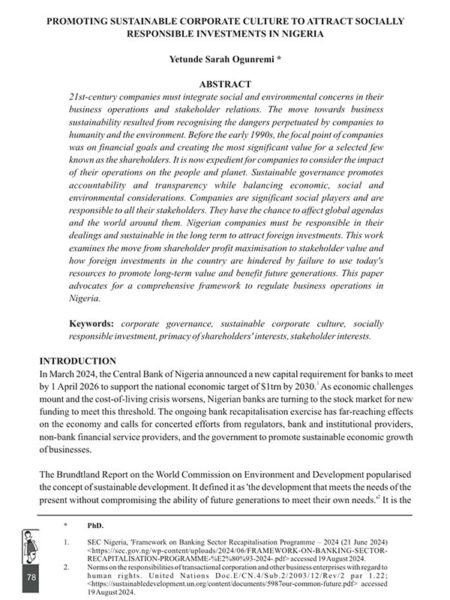
Promoting Sustainable Corporate Culture to Attract Socially Responsible Investments in Nigeria
0₦2,500.00Yetunde Sarah Ogunremi, in her article, Promoting Sustainable Corporate Culture to Attract Socially Responsible Investments in Nigeria, explores the need for companies to integrate social and environmental concerns in their business operations and stakeholder relations. The move towards business sustainability was as a result of the recognition of the dangers perpetuated by companies to humanity and the environment. Prior to the early 1990s, the focal point of companies was on financial goals and creating the greatest value for a selected few known as the shareholders. It is now expedient for companies to consider the impact of their operations on the people and planet. Sustainable governance promotes accountability and transparency while balancing economic, social and environmental considerations. Companies are significant social players and responsible to all their stakeholders. They have the chance to affect global agendas and the world around them. Nigerian companies must be responsible in their dealings and sustainable in the long term in order to attract foreign investments. Ogunremi examines the move from shareholder profit maximization to stakeholder value and how foreign investments in the country are hindered by failure to use resources of today in ways that promote long term value and benefit to future generations. Ogunremi advocates for a comprehensive framework to regulate business operations in Nigeria.
-
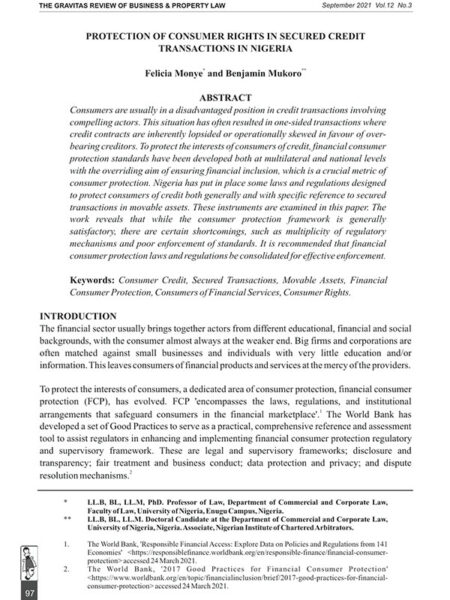
Protection of Consumer Rights in Secured Credit Transactions in Nigeria
0₦2,500.00Professor Felicia Monye of the Faculty of Law, University of Nigeria and Benjamin Mukoro, Doctoral Candidate at the Faculty of Law, University of Nigeria, in their article, Protection of Consumer Rights in Secured Credit Transactions in Nigeria, consider the existing laws and regulations designed to protect consumers of credit with a focus on secured transactions in movable assets. They note that while the consumer protection framework is generally satisfactory, there are certain shortcomings, such as multiplicity of regulatory mechanisms and poor enforcement of standards.
-
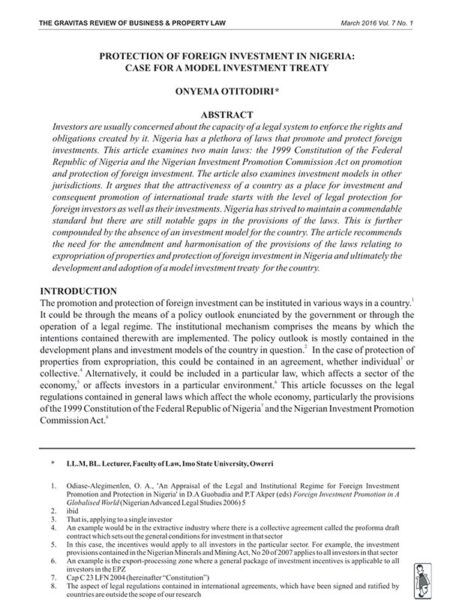
Protection of Foreign Investment in Nigeria: Case for a Model Investment Treaty
0₦2,500.00Onyema Otitodiri, Lecturer, Faculty of Law, Imo State University, Owerri in “Protection of Foreign Investment in Nigeria: Case for a Model Investment Treaty” analyses the state of Nigerian law on foreign investment, its promotion, protection and probable expropriation. He makes a case for the adoption of a model investment treaty to harmonise the provision of the laws and standardise treatment of foreign investors.
-
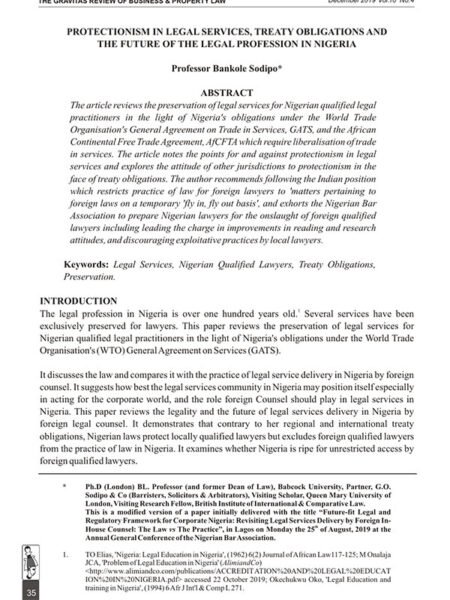
Protectionism in Legal Services, Treaty Obligations, and the Future of the Legal Profession in Nigeria
0₦2,500.00Professor Sodipo Bankole of Babcock University; Visiting Scholar, Queen Mary University of London and Partner GO Sodipo & Co in his article, Protectionism in Legal Services, Treaty Obligations and the Future of the Legal Profession in Nigeria, reviews the preservation of legal services for Nigerian qualified legal practitioners by the Legal Practitioners Act in the light of Nigeria’s obligations under the World Trade Organisation’s General Agreement on Trade in Services, GATS, and the African Continental Free Trade Agreement, AfCFTA, which require liberalisation of trade in services. He surmises that while the onslaught of foreign lawyers in Nigeria may only be a matter of time, Nigeria will do well to adopt the Indian position which restricts the practice of law for foreign lawyers to ‘matters pertaining to foreign laws on a temporary ‘fly in, fly out basis’. Professor Bankole exhorts the Nigerian Bar Association to prepare for the onslaught by leading the charge in improvements in reading and research attitudes and discouraging exploitative practices by local lawyers.
-
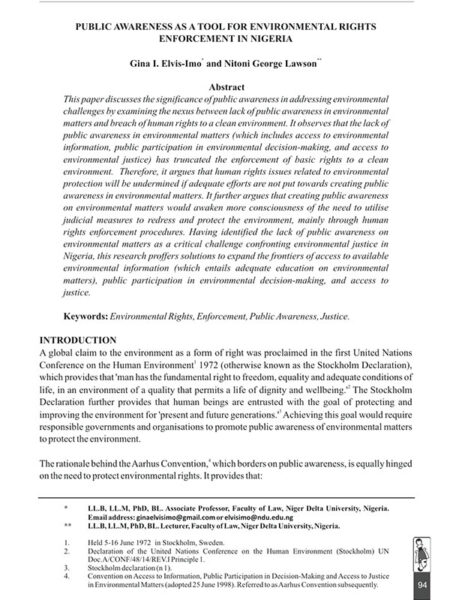
Public Awareness as a Tool for Environmental Rights Enforcement in Nigeria
0₦2,500.00Dr Gina Elvis-Imo and Nitoni Lawson, Associate Professor and Lecturer respectively, at the Niger Delta University, in their article, Public Awareness as a Tool for Environmental Rights Enforcement in Nigeria, discuss the significance of public awareness in addressing environmental challenges by examining the nexus between lack of public awareness in environmental matters and breach of human rights to a clean environment. They argue that human rights issues related to environmental protection will be undermined if adequate efforts are not put towards creating public awareness in environmental matters. Creating public awareness on environmental matters would awaken more awareness of the need to use judicial measures to redress and protect the environment. They then proffer solutions to expand the frontiers of access to available environmental information, public participation in environmental decision-making, and access to justice.
-
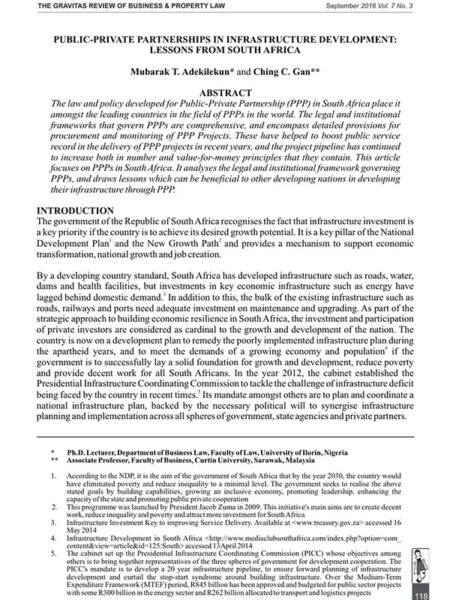
Public-Private Partnerships in Infrastructure Development: Lessons from South Africa
0₦2,500.00Dr. Mubarak Adekilekun of the Faculty of Law, University of Ilorin and Dr. Ching Gan, Associate Professor, Faculty of Business, Curtin University, Sarawak, Malaysia in their article,“Public-Private Partnerships in Infrastructure Development: Lessons from South Africa” explore the world of PPPs in South Africa analysing several legislations that have enabled a phenomenal growth of infrastructure development in the country. They contemplate several factors considered in evaluating PPP projects including Affordability, Value for Money and Risk Transfer.
The Gravitas Review of Business & Property Law



